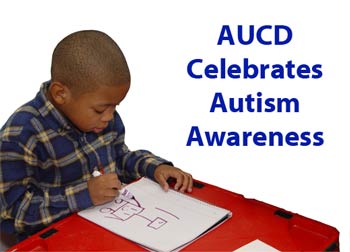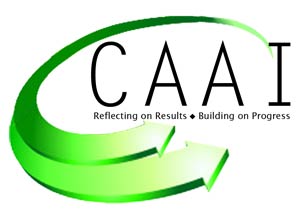AUCD Celebrates April as Autism Awareness Month
April 1, 2013

|
On December 18, 2007, the UN General Assembly designated April 2 as World Autism Awareness Day, which was first observed in 2008. This UN resolution is one of only three official disease-specific United Nations Days that brings world attention to autism spectrum disorder, a developmental disorder that affects as many as 1 in 50 children, according to new estimates from the Centers for Disease Control and Prevention (CDC) and the Health Resources and Services Administration (HRSA). In this spirit, the entire month of April is recognized as National Autism Awareness Month1.
AUCD joins the autism community in celebrating this month focused on raising awareness of the needs of families and individuals affected by autism and the research and training that is underway to address those needs. Although significant progress has been made over the past few years, a great deal more needs to be done in developing appropriate services and supports for children, adolescents and adults on the autism spectrum and their families.
AUCD and our national networks are taking action by providing cutting edge information, news, events and resources. AUCD's network of nonprofit university-based interdisciplinary centers which include 67 UCEDDs, 43 LENDs and 15 IDDRCs, work in every state and territory to advance policy and practice for people living with disabilities and their families. Below, are just a few highlights from AUCD's current autism-related activities in diagnosis, treatment, supports, professional training, research and education.
Collaboration
AUCD collaborates with federal and state agencies, university centers, and other nonprofit organizations to promote the health, education and well-being of individuals with autism and other developmental disabilities, their families and their communities. These collaborations help advance policies and practices at the local, state and national level.
 |
"Learn the Signs. Act Early."
AUCD collaborates with the Centers for Disease Control and Prevention (CDC), the Health Resources and Services Administration (HRSA) and the Association of Maternal and Child Health Programs (AMCHP) on the "Learn the Signs. Act Early." program. The program aims to improve early identification of children with autism and other developmental disabilities so children and families can get the services and support they need. The “Learn the Signs. Act Early.” program also serves as the foundation for the Act Early Network, a collaborative initiative that supports work being done across the country to improve early identification. The Act Early Network is comprised of three parts: 1) Act Early Forum, an email discussion forum and webinar series; 2) Act Early Ambassadors, early identification champions in 25 states; and 3) Act Early State Systems Projects, 10 funded projects for improving early identification. Visit www.aucd.org/actearly to learn more.
 |
SPHARC
AUCD works closely with the Association of Maternal and Child Health Programs' (AMCHP) State Public Health Autism Resource Center (SPHARC). The purpose of this center is to develop a strategy for defining, supporting, and monitoring the role of state Public Health agencies in assuring that children and youth with ASD and other developmental disabilities receive early and timely identification, diagnosis, and intervention.
 |
CAAI Network
AUCD partners with HRSA to help support three sets of granteess funded under the MCHB Combating Autism Act Initiative (CAAI): training grantees including Leadership Education in Neurodevelopmental Disabilities (LEND) programs and Leadership Education in Developmental-Behavioral Pediatrics (DBP) programs; research grantees and state implementation grantees. These programs help achieve the CAAI goal of enabling all infants, children and adolescents who have or are at risk for developing autism spectrum disorder (ASD) and other developmental disabilities (DD) to reach their full potential by: 1) developing a system of services that includes screening children for early possible ASD and other DD; 2) conducting early, interdisciplinary evaluations to confirm or rule out ASD and other DD; and 3) providing evidence-based, early interventions when a diagnosis is confirmed.
 |
Training
The purpose of the Interdisciplinary Technical Assistance Center (ITAC) on Autism and Developmental Disabilities at AUCD is to improve the health of infants, children, and adolescents who have, or are at risk for developing, ASDs and other developmental disabilities. ITAC provides technical assistance to LENDs and Developmental-Behavioral Pediatrics (DBP) training programs funded by the Maternal and Child Health Bureau to better train professionals to utilize valid and reliable screening tools to diagnose or rule out and provide evidence-based interventions for children with ASD and other developmental disabilities.
Information Dissemination
AUCD and its network of nonprofit university-based interdisciplinary centers work in every state and territory to advance policy and practice for people living with disabilities and their families. AUCD, our national networks and partners regularly collaborate to disseminate cutting edge news, materials and publications, events and resources.
Postsecondary Options for Students with ASD: Three Programs and a Parent Perspective
- April 15, 2:30-3:30 pm ET
- Presentations will include an overview of three programs and a parent perspective. Cathryn Weir, M.Ed., will discuss how Think College works with programs for students with autism who are not likely to matriculate, how they work with programs around the country, and resources they have available. Barbara Becker-Cottrill, Ed.D., and Marc Ellision, Ed.D., will provide details on how The College Program for Students with Asperger’s Syndrome at Marshall University supports students in the program, including strategies for working with professors, residence advisors and others involved in the life of the student; details will also be provided about a summer college experience for high school students. Cathy Pratt, Ph.D., BCBA-D, will share information about Students on the Spectrum at Indiana University, a student-directed club facilitated by the Indiana Resource Center for Autism. The club provides social, support and informational opportunities and has covered topics such as effective self-advocacy, dealing with anxiety, communication and social skills, and finding supports and activities on campus and in the community. Scott Badesch, M.A., will discuss what a parent needs to know and do to help their child succeed when they are living with autism.
Targeted Treatments for Autism: From Genes to Pharmacology
- This webinar is part of The Amazing Brain webinar series.
- April 23, from 12-1 pm ET
- The presenter will discuss translational research related to targeted drug development for core symptoms of autism based on the emerging understanding of autism neuroscience, explain the "targeted treatment" approach to drug development for autism, discuss the synapse as a convergence point for multiple genes associated with autism, and describe the challenges to demonstrating treatment efficacy on the core symptoms of autism.
Upcoming and past webinars on autism spectrum disorders and other topics are housed in the AUCD Webinar Library. All of our archived webinars are free and open to the general public.
 |
Publications
Developments Newsletter
Developments is a quarterly newsletter for grantees of the Combating Autism Act Initiative (CAAI). Published by AUCD's Interdisciplinary Technical Assistance Center on Autism and Developmental Disabilities (ITAC) in partnership with AMCHP's State Public Health Autism Resource Center (SPHARC), this newsletter allows grantees and partners to share current news, activities, events, research, and accomplishments in autism and related developmental disabilities with program faculty, students, and supporters. Sections of the newsletter are regularly devoted to each of the grantee groups (research, states, LEND training and DBP training), as well as MCHB and our collaborating partners.
CAAI Infographic
The Combating Autism Act Initiative (CAAI) was created by the Maternal Child Health Bureau in 2008 to promote early screening, diagnostic evaluation, and intervention for children with autism spectrum disorders and other developmental disabilities through training, awareness building, research, and systems development. This infographic shows data highlighting some of the accomplishments from LEND Programs under CAAI since 2008.
Additional Resources
- CDC's Autism Resource Center
- CDC's "Learn the Signs. Act Early." program
- CDC's Autism Case Training: A Developmental-Behavioral Pediatrics Curriculum
- HRSA's Maternal and Child Health Training Program
- Combating Autism and Other Developmental Disabilities (HRSA)
- Eunice Kennedy Shiver National Institute of Child Health and Human Development
- Interagency Autism Coordinating Commmittee
2013 Statements on World Autism Awareness Day/Month
- US Presidential Proclamation for World Autism Awareness Day
- HHS Secretary Kathleen Sebelius Statement on National Autism Awareness Month
- United Nations Secretary-General Ban Ki-moon's message for World Autism Awareness Day
- United Nations Events to Mark Observance of World Autism Awareness Day
About Autism Spectrum Disorder
Autism is a complex developmental disability that typically appears during the first three years of life and affects a person's ability to communicate and interact with others. Autism is defined by a certain set of behaviors and is a "spectrum disorder" that affects individuals differently and to varying degrees. There is no known single cause for autism, but increased awareness and funding can help families today. For more information about autism and early warning signs, see CDC's Autism Information Center and "Learn the Signs. Act Early." program.








